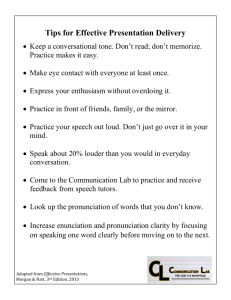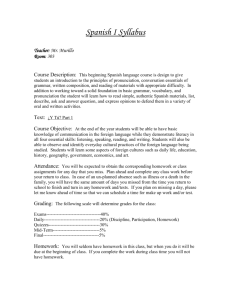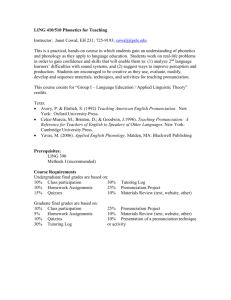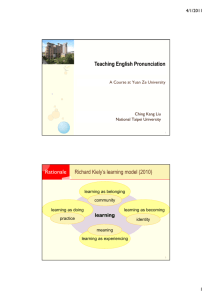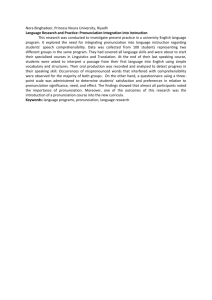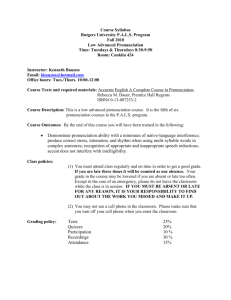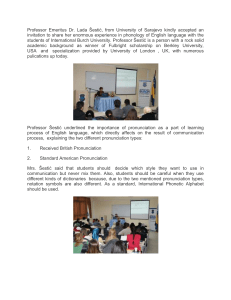CELTA Lesson Plan Name: Michael Raikhlin Date: 12.02.2013
advertisement
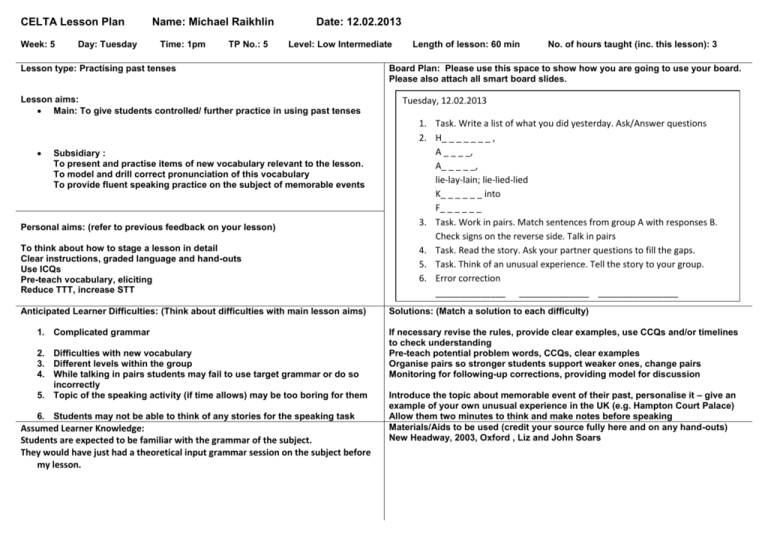
CELTA Lesson Plan Week: 5 Day: Tuesday Name: Michael Raikhlin Time: 1pm TP No.: 5 Date: 12.02.2013 Level: Low Intermediate Lesson type: Practising past tenses Lesson aims: Main: To give students controlled/ further practice in using past tenses Subsidiary : To present and practise items of new vocabulary relevant to the lesson. To model and drill correct pronunciation of this vocabulary To provide fluent speaking practice on the subject of memorable events Personal aims: (refer to previous feedback on your lesson) To think about how to stage a lesson in detail Clear instructions, graded language and hand-outs Use ICQs Pre-teach vocabulary, eliciting Reduce TTT, increase STT Anticipated Learner Difficulties: (Think about difficulties with main lesson aims) 1. Complicated grammar 2. Difficulties with new vocabulary 3. Different levels within the group 4. While talking in pairs students may fail to use target grammar or do so incorrectly 5. Topic of the speaking activity (if time allows) may be too boring for them 6. Students may not be able to think of any stories for the speaking task Assumed Learner Knowledge: Students are expected to be familiar with the grammar of the subject. They would have just had a theoretical input grammar session on the subject before my lesson. Length of lesson: 60 min No. of hours taught (inc. this lesson): 3 Board Plan: Please use this space to show how you are going to use your board. Please also attach all smart board slides. Tuesday, 12.02.2013 1. Task. Write a list of what you did yesterday. Ask/Answer questions 2. H_ _ _ _ _ _ _ , A _ _ _ _, A_ _ _ _ _, lie-lay-lain; lie-lied-lied K_ _ _ _ _ _ into F_ _ _ _ _ _ 3. Task. Work in pairs. Match sentences from group A with responses B. Check signs on the reverse side. Talk in pairs 4. Task. Read the story. Ask your partner questions to fill the gaps. 5. Task. Think of an unusual experience. Tell the story to your group. 6. Error correction ______________ ______________ ________________ Solutions: (Match a solution to each difficulty) If necessary revise the rules, provide clear examples, use CCQs and/or timelines to check understanding Pre-teach potential problem words, CCQs, clear examples Organise pairs so stronger students support weaker ones, change pairs Monitoring for following-up corrections, providing model for discussion Introduce the topic about memorable event of their past, personalise it – give an example of your own unusual experience in the UK (e.g. Hampton Court Palace) Allow them two minutes to think and make notes before speaking Materials/Aids to be used (credit your source fully here and on any hand-outs) New Headway, 2003, Oxford , Liz and John Soars Form of Target Language Meaning/function (in the context Vocabulary or Structure (part of that you are teaching it) speech, name of tense, analysis of form of an example sentence) Feeling sad because you are Homesick, adjective compound away from home Awful, adjective Very bad, of low quality, or unpleasant In or to a foreign country Abroad, adverb Lay, verb irregular Past Simple form of ‘to lie’, Past Participle lain. Present Participle - lying Can be confused with ‘to lie’- to say lies – lying, lied, lied. Knocked into (the water), prepositional verb, regular, past simple form of ‘to knock into’ To be in a horizontal or flat position on a surface To hit something or someone and send them into something such as an object (a lamppost) or a place. (the water) Concept Check Questions with answers Pronunciation – phonemic script transcription, word or sentence stress, weak forms, intonation. (Highlight any potential problems) Can I get homesick because I ate some bad food? (No) Do you miss your family and/or your home country, if you are homesick? (Yes) If you watched a movie and thought it was not bad, not good, just OK, can you say it was awful? (No) If you didn’t like the meal and felt sick after eating in this restaurant can you say that the place was awful? (Yes) Are you abroad now? (Yes) If you went back to your home country at Christmas, did you go abroad? (No) When you came from your country to London, were you going abroad? (Yes) (Lie on the floor) Am I lying? (Yes) Where am I lying? (on the floor) (stand up) Am I lying? (No) (repeat this procedure until everyone understands) /ˈhəʊmsɪk/ If you punch me in the head and I fall and hit the wall, can I say you knocked me into the wall? (Yes) /nɒ kˈɪntə/ Stress on the first syllable /ˈɔːfəl/ Stress on the first syllable, schwa sound for the letter ‘u’ /əˈbrɔːd/ Stress on the second syllable /leɪ/ To lie - /laɪ/ Two words are linked together with the stress on the second syllable of the connected structure Stage/ Purpose Procedure Interaction To ensure students understood the previous task they have done with Ryan and have the ability to use correct tenses. Say, now you are going to write a similar list about what you did yesterday. ICQs: Are you going to discuss your day in groups or write on your own? (write on your own) Are you going to start phrases with a verb in Past Simple or with a noun? (with a verb in Past Simple) If necessary, elicit an example from a stronger student to check understanding. Hand out the lists with timings to each student S Time Individua l work/ 3-4 min Pair work To ensure students 3-4min understood the task and have the ability to use correct tenses when talking about the past events. To note errors for follow up corrections. Organise pairs. Say, ‘Now you are going to talk with your partner. Ask him/her questions about his/her day. SS CCQs: When you talk about one time in the past and something we were in the middle of doing at that time do we use past continuous or past simple? (Past continuous) So when we ask questions about these times yesterday will you use past continuous or past simple? (Past continuous) ICQ: Are you going to work in pairs? (Yes) If necessary, elicit an example from a stronger pair to check they all understand Monitor discretely with a pen and paper noting errors in grammar, word use and pronunciation. Preteaching vocabula ry / 7-8 min To clarify the meaning, to provide a model of accurate pronunciation Elicit the meaning. Say, ‘I am studying in a foreign country, I miss my family and friends a lot, I miss my HOME; everything is very different, how do I feel?’ If necessary give first letters of two parts: H_ _ _s_ _ _. If necessary, Check understanding with CCQs (see Target Language sheet) Board words drill pronunciation. If necessary, board phonetics Imitate entering and eating in a bad restaurant and feeling sick afterwards. Say, ‘I was in a very bad restaurant; food was not tasty and not fresh. I felt seek later. I called my friend and told him, ‘I was in an A _ _ _ _ place.’ If necessary, board first letters. If necessary, Check understanding with CCQs (see Target Language sheet) Board words, drill pronunciation. If necessary, board phonetics Say to students; 'You all are in London now, you are in a T-SSS different country. So, you are A_ _ _ _ _. If necessary, check understanding with CCQs (see Target Language sheet) Board words drill pronunciation. If necessary, board phonetics Say to students, ‘If you are at home and are tired, you go to bed to l_ _ down and rest.’ (Lie down on the floor if necessary to clarify the meaning) Board the verb ‘to lie’. ‘Do you know Past Simple and Past Participles of this verb? (Lay, lain) Board them, drill pronunciation. Say, ‘It is an irregular verb. (Is the verb ‘go’ irregular? (Yes) Is the verb ‘start’ irregular? (No)) do not confuse it with the regular verb with the same spelling. To lie – lied –lied Stand 2 hard-backed dictionaries on the table so they are linedup like dominoes. Punch one over so it hits the other. Say, ‘I hit the book and it hit the next book’ I k ___________this book ______ the other book. (board the first letters if necessary) Say to students, ‘Something makes me very-very angry, it happens again and again. For example, here is my paperwork, I said to a student not to drink coffee in my class, next time he drinks coffee again and drops the cup on my paperwork. I am going mad; How do I feel? If necessary board the first letter. I am F U R I O U S. Pair work To provide accuracy practice in context 5-7 min using the Past Perfect tense. To obtain evidence of learning Organise pairs. Ask students first to read sentences to each other and then to match them. Give one set of strips to student A, another to student B SS Ask them to check the matching symbols on the reverse side of the strips. Ask students to read correct combinations of sentences in pairs. Model activity with a strong student if necessary ICQ: Are you going to read only one sentence each or both sentences? (only one) Individua l work 5min To practice questions using the Past Simple and Past Continuous To encourage studentcentred learning. Organise different pairs. Say, ‘Now you are going to read the story. Read it on your own. There is some information missing in A’s text that B has in theirs and some missing in B’s text that A has. (Project the two texts and point to the corresponding gaps). Think of questions to find out this information and write them down’ S SS Pair work To note errors for follow 7-10 min up corrections Board the example gapped sentence from the A text, ask ‘What question can A ask B to find this information?’ Elicit and board the question. Point out the first gap in the text B, elicit the question. Write the correct answer in the gap on the board. If necessary, repeat this process so everyone gets the idea. ICQ: Are you going to read the story together? (No) Are you going to read only or are you going to read and write? (Read and write) What are you going to write? (questions) Give students A and B the same text with different bits of information missing. Monitor and check students understand and that they are using the correct tenses in their questions. Note down errors, or discretely encourage students to correct their own mistakes. Say, ‘Now you need to ask your partner the questions you have written to find out the information missing in your story.’ ICQ: Is this a speaking exercise or a reading exercise? (A speaking exercise) So are you going to look for answers in your partner’s sheet, or ask him questions about it? (Ask him questions) Setting up a task 5-8 min To set the scene, personalise the topic, to convey meaning through context Say, now you are going to talk with each other about an interesting, strange or funny experience you had in your life, may be something that happened to you in London. I’ll tell you my story. When I came to London, long time ago, in the last century…(skewer - /skjʊər/) T-SSS Say, ‘Before you start speaking, spend 2 minutes thinking about what you are going to say. You might like to write down a few words to help you speak. Students think in silence for a minute or two, when they look ready, quickly go around the class checking to make sure everyone has a story to tell. Group work/ 10-12 min To give students chances to further practice the target language. To provide fluency practice, to encourage student-centred learning. To note errors for follow-up correction. Feedbac k and error To get students to pool existing knowledge Organise groups. Say 'now you're going to talk in your groups. When someone is telling the story, you may also ask questions.’ SSS Rephrase this idea in order to promote appropriate behaviour and respect for others: ‘Respect each member of the class when they are talking’ and ‘keep confidentiality within the classroom – what is said in class remains in class.’ ICQs (if needed) Are you going to be writing or speaking? (speaking) Monitor discretely with a pen and paper noting errors in grammar, word use and pronunciation. Write incorrectly used structures on the board; attempt to elicit corrections from students. If time allows, invite them to go T-SSS correctio n/ 4-10 min To obtain evidence of learning To bring the activity to a close. To elicit and board corrections to errors made in form, meaning, phonology. forward and correct structures. Board errors in pronunciation using phonetics, drill correct pronunciation individually and chorally if necessary If pressed for time, ask one or two important and feedback questions and board one error in usage and pronunciation respectively. If more time is available spend longer on this stage SSS-T
